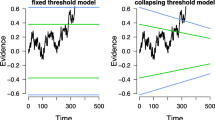Abstract
Kagan (1965a) developed the concepts of impulsive and reflective cognitive styles (conceptual tempo) to add a new dimension to the understanding and assessment of human intelligence. Although latency (the principal component of conceptual tempo) is negatively correlated with academic performance, it may not be necessary to modify latency in order to modify accuracy. With 40 disadvantaged preschool children, it was found that reinforcing long latencies in choice tasks did not increase accuracy and vice versa, and that reinforcing both long latencies and accuracy was no more effective than reinforcing accuracy alone. These data were used to question the usefulness of the construct of conceptual tempo.
Similar content being viewed by others
References
Cathcart, W. G., & Liedtke, W. Reflectiveness/impulsiveness and mathematics achievement.The Arithmetic Teacher, 1969(Nov.), 563–567.
Debus, R. L. Effects of brief observation of model behavior on conceptual tempo of impulsive children.Developmental Psychology, 1970,2, 22–32.
Denney, D. R. Modeling effects upon conceptual style and cognitive tempo.Child Development, 1914,43, 105–119.
Egeland, B. Training impulsive children in the use of more efficient scanning techniques.Child Development, 1974,45, 165–171.
Errickson, E. A., Wyne, M. D., & Routh, D. K. A response-cost procedure for reduction of impulsive behavior of academically handicapped children.Journal of Abnormal Child Psychology, 1973,1, 350–357.
Hemry, F. P. Effect of reinforcement conditions on a discrimination learning task for impulsive versus reflective children.Child Development, 1973,44, 657–660.
Kagan, J. Impulsive and reflective children: Significance of conceptual tempo. In J. D. Krumboltz (Ed.),Learning and the educational process. Chicago: Rand McNally, 1965. Pp. 133–161.
Kagan, J. Reflection-impulsivity and reading ability in primary grade children.Child Development, 1965,36, 609–628.
Kagan J. Reflection-impulsivity: The generality and dynamics of conceptual tempo.Journal of Abnormal Psychology, 1966,71(1), 17–24.
Kagan, J., Rosmon, B. L., Day, D., Albert, and Phillips, W. Information processing in the child: Significance of analytic and reflective attitudes.Psychological Monographs, 1964, 78(1, Whole No. 578).
Kagan, J., Pearson, L., & Welch, L. Conceptual impulsivity and inductive reasoning.Child Development, 1966,37, 583–594.
Kagan, J., Pearson, L., & Welch, L. Modifiability of an impulsive tempo.Journal of Educational Psychology, 1966,57, 359–365.
Lahey, B. B., & Lefton, L. A. Discrimination of letter combinations in good and poorKaders.Journal of Special Education, 1916,10, 205–210.
Lahey, B. B., & McNees, M. P. Letter discrimination errors in kindergarten through third grade: Assessment and operant training.Journal of Special Education, 1915,9, 191–199.
Massari, D. J., & Schack, M. L. Discrimination learning by reflective and impulsive children as a function of reinforcement schedule.Developmental Psychology, 1972,6, 183.
Meichenbaum, D. H., & Goodman, J. Training impulsive children to talk to themselves: A means of developing self control.Journal of Abnormal Psychology, 1971,11, 115–126.
Messer, S. B. Reflection-impulsivity: Stability and school failure.Journal of Educational Psychology, 1970,61, 487–490.
Ridberg, E. H., Parke, R. D., & Hetherington, E. M. Modification of impulsive and reflective cognitive styles through observation of film-mediated models.Developmental Psychology, 1971,5, 369–377.
Skinner, B. F.The technology of teaching. New York: Appleton-Century-Crofts, 1969.
Wright, J. C.The Kansas Reflection-impulsivity Scale for Preschoolers (KRISP). St. Louis: CEMREL, 1971.
Zeinicker, T., Jefferey, W. E., Ault, R., & Parsons, J. Analysis and modification of search strategies of impulsive and reflective children on the Matching Familiar Figures test.Child Development, 1972,43, 321–335.
Author information
Authors and Affiliations
Additional information
This article is based on a master's thesis prepared by the first author under the supervision of the second author.
Rights and permissions
About this article
Cite this article
Williams, M., Lahey, B.B. The functional independence of response latency and accuracy: Implications for the concept of conceptual tempo. J Abnorm Child Psychol 5, 371–378 (1977). https://doi.org/10.1007/BF00915085
Revised:
Issue Date:
DOI: https://doi.org/10.1007/BF00915085




